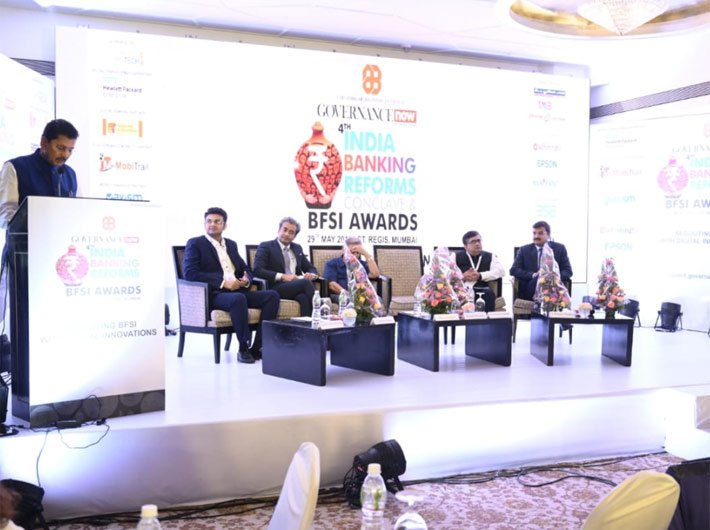Deepak Kesarkar, Maharashtra's MoS for Finance, Rural Development, spoke about India becoming the largest economy at the Governance Now 4th India Banking Reforms Conclave and BFSI Awards
“The banking sector under the leadership of prime minister Narendra Modi has seen major announcements like the bold step of demonetization and PMJDY which were never seen before. We are now looking at the banking sector to reach the poorest of poor in society who have high aspirations from the new government,” said Deepak Kesarkar, MoS, for Finance, Planning and Home (rural), Government of Maharashtra. He was delivering his keynote address at the Governance Now 4th India Banking Reforms Conclave and BFSI Awards – Rebooting BFSI with Digital Innovations.
Kesarkar also said that farm products must be given value addition as a priority and corporates encouraged to reach out to famers. He added that with proper planning of economy India has all the potential to become largest economy in the world and banking sector could be instrumental in bringing this change.
In his special address, Ashish Kumar Chauhan, MD and CEO, BSE, said that earlier governments only announced policies which were not executed. With the NDA government setting up ‘Jan dhan’ and ‘Aadhar Mobile’ framework in mission mode in its first term and opening 34-35 crore accounts it was unprecedented not only in India but across the world. Direct Benefit Transfer (DBT) to farmers and beneficiaries for building toilets, children’s education or ‘Ujwala scheme’ were unheard of. “Through my various interactions with US and Chinese nationals I came to know that they do not have as solid a biometric identity as ours. We leap frogged from 19th century technology to 21st century. The US, which was ahead of us, is 50 years behind us,” he said.
Chauhan added that the banking system very rapidly through technology and there is a lot of churn of ideas. It depends on RBI and policy makers to ensure that we manage this change without anarchy. While outlining other reforms he also said that no other country has a system like RTGS run by the central bank for making real time gross settlement without mistake. This is unheard of anywhere in the world.
Satish Marathe, part-time director, RBI said that current challenges of unemployment and agricultural distress cannot alone be solved by the government alone and he added that the role of manufacturing sector has been substantially and gradually coming down.
“Our trade and tariff policy agreements with various countries promoting free trade across quarters have created their own problems in our country. We need to relook these policies if we should have our own agreements of most favored nation and trade blocks and if subsidies and concessions to our nascent industry can be avoided. We have to consider that even developed countries are directly and indirectly are substantially supporting global industry and agriculture in overall GDP”.
Speaking about the important role of SME’s he said that with more than 65 lakh registered and unregistered SME’s in country their contribution to GDP is roughly 50 percent with contribution to exports at 40 percent to 45 percent. They provide employment to about 10-12 crore people and are no longer concentrated in urban areas.
“With almost 25 percent SME’s in rural areas this has not been factored by the banks, policy makers and economy. Out of the total credit only 16 percent has been extended to the SME sector and this the problem is. These SME’s require support from banks and the government and will continue to remain key growth drivers in Indian economy. They need time to develop products, market and sell in order to earn profit .Support in the form of capital and quasi capital is necessary to promote SME sector,” said Marathe.
He added that SME in India have to play a significant role in development of allied agriculture activities. As compared to developed countries which are processing 70 percent to 75 percent of their agriculture produce, countries in South East Asia are processing about 50 percent 60 percent whereas India is only processing between 18 percent to 20 percent and that is the real problem.
“This is not only waste age of agricultural produce which does not have a shelf life or reach market when it should through the year and farmers are denied the income they should get. We have affordable technology which can be easily put to use for setting up agro processing units and I believe this will solve rural distress and provide income earning opportunities to youth migrating to cities in big numbers for menial jobs. Like financial literacy he also underlined the importance of spreading literacy about worldwide agriculture products farmers,” said Marathe.
The edition of Governance Now 4th India Banking Reforms Conclave and BFSI Awards – Rebooting BFSI with Digital Innovations will also give away Governance Now BFSI Awards 2019 to those public, private and foreign banks operating in India, NBFI’s and Fin techs that have been instrumental in the country’s growth and digital financial inclusion. Additionally Jury Choice Award and Value Growth Award will be given to organizations that have stood out.

